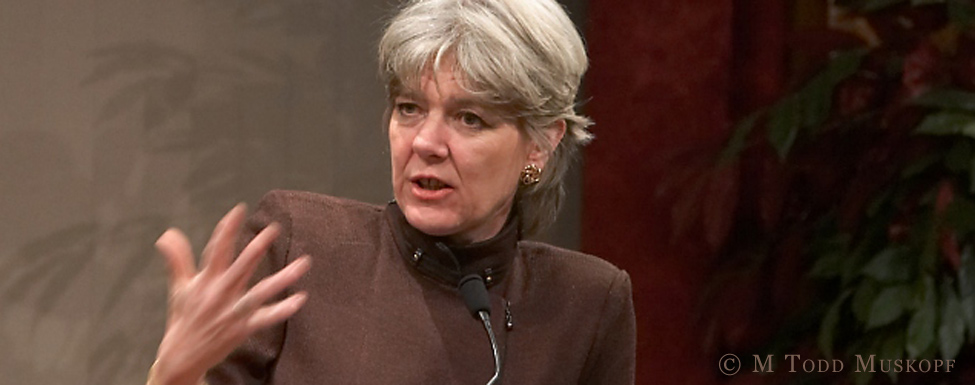Anne Garrels
Two veteran combat correspondents, including Anne Garrels of Norfolk, will reflect on their experiences and the effects of war in an innovative program, Between War & Here that is starting a limited East Coast tour this weekend.
The program combines poems/postcards composed by Carolyn Surrick and performed by former National Public Radio correspondents Anne Garrels and Neal Conan, with music performed by the Ensemble Galilei which plays Irish and Scottish airs and dance tunes, early and medieval music, and original compositions.
“It's an unusual project for me but I was lured into it because the text and music are so extraordinary,” said Garrels, who said that Surrick’s words are often “searing” and sometimes funny.
She and Conan have added essays of their own. “It's a way to remind people of the cost of our all-too-often hidden wars,” she said.
Garrels, who lives in Norfolk, said she was approached by the creators because they were looking for a woman who had experienced war, “who could get it.” The veteran correspondent, a Russian expert, served as the Moscow bureau chief for ABC and as Central American bureau chief from 1984 to 1988 before joining NPR in 1988. She has covered conflicts around the world, including El Salvador, Chechnya, Bosnia, Kosovo, Afghanistan, Pakistan, Israel and Iraq.
“When they called, I said, ‘I hope you don’t think I can sing!’” she related. But she felt compelled to join the project because she found the melding of words and music “riveting.”
She explained that the idea began germinating after the death of two of Surrick’s friends in Afghanistan. “She decided she had to do something,” Garrels reported. “That something turned into playing for wounded vets at Walter Reed Veterans Hospital outside Washington ever Friday for seven years. She plays the viola da gamba which you would not think of as the kind of instrument to rock a bunch of young vets but, apart from being an amazing musician, she is extraordinary. Her music is so compelling. Sometimes she would teach someone how to bow and sometimes (the vets) were musicians and they would play together. Only Carolyn could say with pride, ‘I put them to sleep.’”
The experience led to a 2011 book by Surrick, between war and here—short poems that describe some of the wounded warriors she had met during her visits—and later still to a modest theatrical production in Maine.
Believing she could expand on that performance, she approached Garrels and Conan, a 36-year veteran of NPR who was captured by enemy combatants and held for several days during the First Gulf War.
Both readers bring their own experiences of war to the performance. Conan suffered severe PTSD following his captivity and Garrels acknowledges that she stayed in Iraq too long. One of only two women among 16 American journalists at Baghdad’s Palestine Hotel, she lived with the constant fear of being killed or taken hostage.
“Neal suffered PTSD and he talks about it in the program in a deliciously Neal way,” she said. “And I certainly had issues. I stayed too long. I was as arrogant and ignorant about myself as the administration was (about the invasion). I was there for eight years and I was pretty fried. In our essays, we add a little perspective.”
Garrels said she never intended to be a war correspondent. “I got into it by mistake,” she said. “I started with the very Cold War in Russia. Then I was expelled in 1982 and ended up in El Salvador and Nicaragua. But being a correspondent then was not like now. There was no social media and they needed us to get the news out. We wore t-shirts saying, ‘Don’t Shoot, I am a journalist’ and it was not so dangerous—not like now.”
After covering conflicts in the ’91 Gulf War and the Balkans, she was eager to return to Russia and to take a break from war. “I was passionately interested in Russia but I no sooner got there than the Chechen war started. When I left Russia after covering that brutal, devastating war, I though a had a great gig for NPR covering water issues and the fate of the Left in Latin America—but then we had 9/11 and I was in Afghanistan, Pakistan and spent eight years in Iraq.”
Garrels said she stayed during all the bombing in Iraq. “When they were bombing it was quite safe because we knew the targets,” she related. “When the troops came in, from very minute they arrived, it was clear they didn’t know what they were doing. It got worse and worse and worse. I stayed because I couldn’t believe how bad it was.”
Through it all, she was sustained by her “incredibly supportive” husband, J. Vinton Lawrence. She would be in the field for months at a stretch and then spend months at home. “It worked for us. I finally retired in 2011 and then was home all the time.”
She was home, but still busy, working on writing the book, Putin Country: A Journey into the Real Russia.
“Between War and Here is not political,” she said. “It doesn’t get into what went wrong, but it does remind people of the cost of these wars. We don’t have a draft and most people don’t know anyone in the war.”
Performances of Between War and Here begin in Baltimore and Philadelphia before coming to Norfolk Congregational Church April 3rd at7 PM and Infinity Hall in Hartford April 4th at 8PM. The tour ends in Washington, D.C. and Cambridge MA. Norfolk tickets are $20 for adults; $15 for seniors and students, and $10 for military personnel, active. and veteran. In Norfolk, tickets are available at the link below and at the door. In Hartford the performance is free. All proceeds benefit the Special Operations Warrior Foundation.

